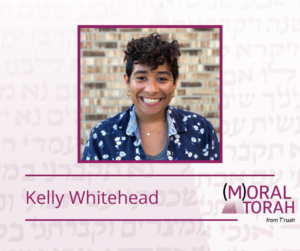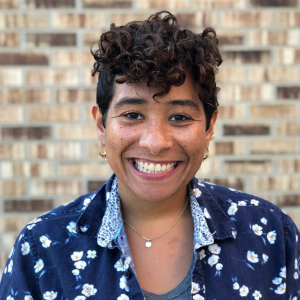A D’var Torah for Juneteenth and Parshat Chukat by Kelly Whitehead
As a black Jew, as I prepare to celebrate Juneteenth, I am reminded of the power of collective memory. While the viciousness of racism has marked every day in this country since the first Juneteenth, the memory of that joy and redemption is pertinent today. The celebration has grown beyond its Texas origins to become a national part of black consciousness, celebrating the day on which black slaves achieved legal freedom from their oppressors. In recent years, it is entering white consciousness and showing up in the national discourse.
Our history is a back-and-forth dance of successes and failures, liberations and oppressions. In Parshat Chukat, Moses hits the rock instead of speaking to it. As punishment, he will not enter the land of Israel, a setback both for him and for the people he led.
Although Abraham Lincoln gave his Emancipation Proclamation in 1863, and the Confederate army surrendered in April 1865, Texas slave-owners did not free their slaves until Union Major General Gordon Granger arrived in June of 1865 and ensured a peaceful transition of power. The following year, freedmen in Texas organized the first of what became the annual celebration of “Jubilee Day” on June 19th.
Sign up to receive (M)oral Torah in your inbox each week.
As new citizens, black men elected representatives to the government in what became known as Reconstruction. However, their term only lasted a few years before white former slave-owners rallied, passed Jim Crow laws, and stripped black citizens of their rights and equality. Without reparations and long-term government support, the fall of Reconstruction in 1877 caused many former slaves to become trapped in cycles of sharecropping. The end of the war freed people from slavery, yet the country denied true justice and equality for people of color. The generation freed by Major General Granger did not get to see full liberation. The promised equality during the origins of Juneteenth is yet to be achieved because the effects of slavery remain ingrained in our current society.
In parshat Chukat, Moses is confronted by the thirsty and rebellious Israelites. The Israelites wandered the desert for many years after leaving Egypt. They cried, “Why did you make us leave Egypt to bring us to this wretched place, a place with no grain or figs or vines or pomegranates? There is not even water to drink!” (Numbers 20:5) To quell their anger and quench their thirst, God tells Moses to assemble the community and order a rock to yield water. Instead of commanding the rock, Moses strikes it with his staff – twice.
Moses was able to temporarily meet the needs of the Israelites, but the benefit was short lived. He didn’t really help them envision the promised land. Lost in the emotion of the moment, Moses couldn’t keep the long-term view in mind. So too with Reconstruction.
The journey is an essential part of the path to collective liberation. Juneteenth is a celebration of just one step of an ongoing journey. While the slaves of Texas were freed in 1865, the path to equality is arduous and ongoing. We do not always see the benefit of our efforts. Moses laid the foundation for freedom, but did not get to see it through because of his rash decision to hit the rock. The original celebration of Juneteenth in 1865 was a starting point. In 2021, we can see the role we all have in laying the groundwork for future generations. Unlike Moses’s example, we can try to be thoughtful and intentional in our actions.
Find more commentaries on Parshat Chukat.
As a black Jew, I view Juneteenth as a reminder of how far we have come, and how far we still have to go. We can urge our government to provide reparations for descendants of the formerly enslaved and use our power to speak out against and undermine today’s deeply rooted systems of oppression. We can call out forms of modern day slavery in the mass incarceration of black and brown people. We can be more cautious with our actions as long as we are taking part in the ongoing battle for liberty. Moses saw a problem and he fixed it in a way that was rash, irresponsible, yet effective in the moment. We can learn from our great leaders’ mistakes. We can dig deeper, see the underlying issues of racism in our world.
In our own celebration of Juneteenth, we must see ourselves as part of the continuation of liberation. White people can use the holiday as a time to learn about the current racist systems rooted in slavery and support black people in our celebration.
 God tells Moses to speak to the rock, but instead, he jumps to action. Action is not a bad thing, it just needs to be thought through and correct. When it comes to Juneteenth celebrations in our Jewish spaces, speak before you act. Even better, listen before you act. I encourage you to reach out to black people in your community to best meet their needs, instead of making assumptions. We cannot enter the promised land until all of us are truly free, and we can only do that through thoughtful and empowered action.
God tells Moses to speak to the rock, but instead, he jumps to action. Action is not a bad thing, it just needs to be thought through and correct. When it comes to Juneteenth celebrations in our Jewish spaces, speak before you act. Even better, listen before you act. I encourage you to reach out to black people in your community to best meet their needs, instead of making assumptions. We cannot enter the promised land until all of us are truly free, and we can only do that through thoughtful and empowered action.
Kelly Whitehead is a rising third year rabbinical student at Hebrew Union College – Jewish Institute of Religion, a member of the T’ruah Board, and an alum of T’ruah’s Israel Fellowship. They currently reside in Brooklyn.


